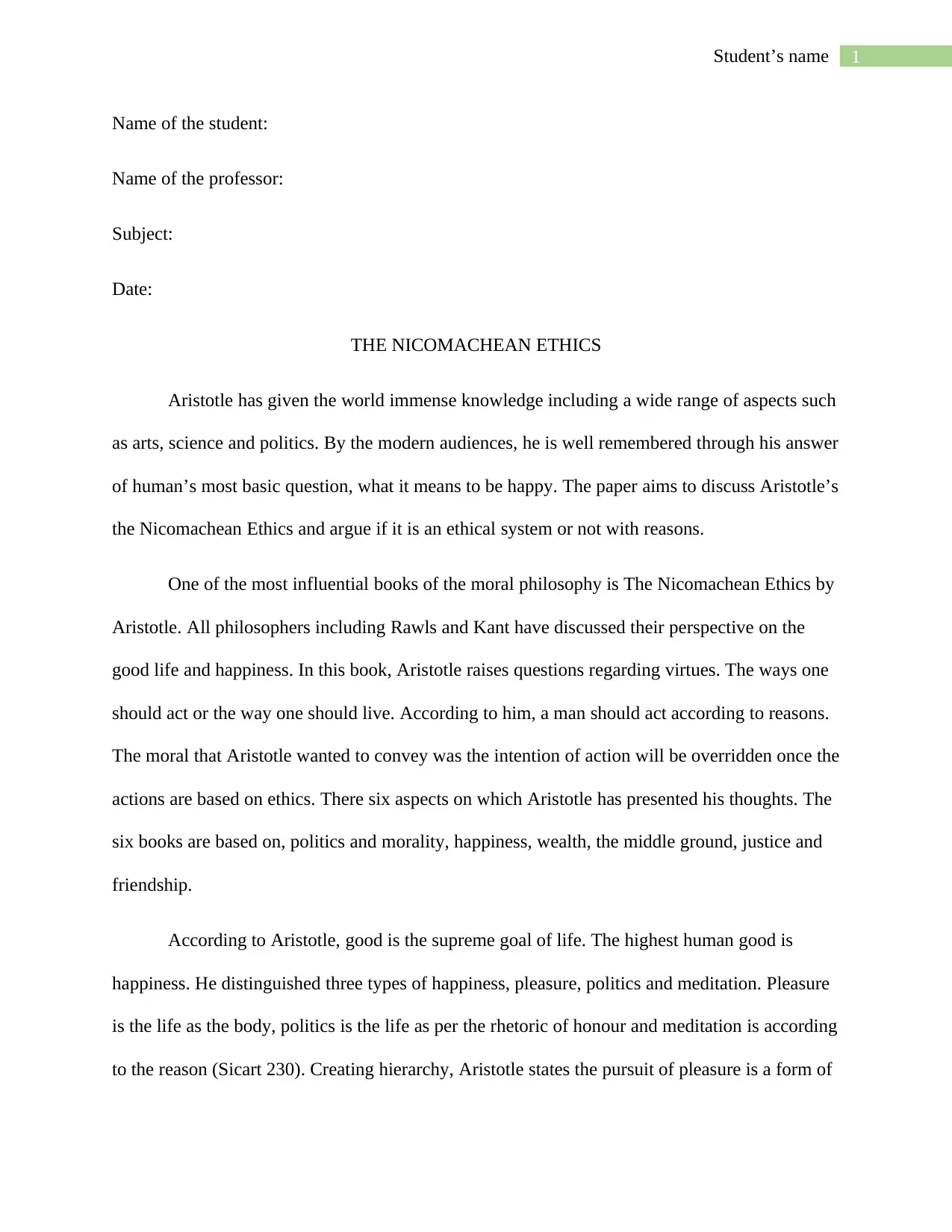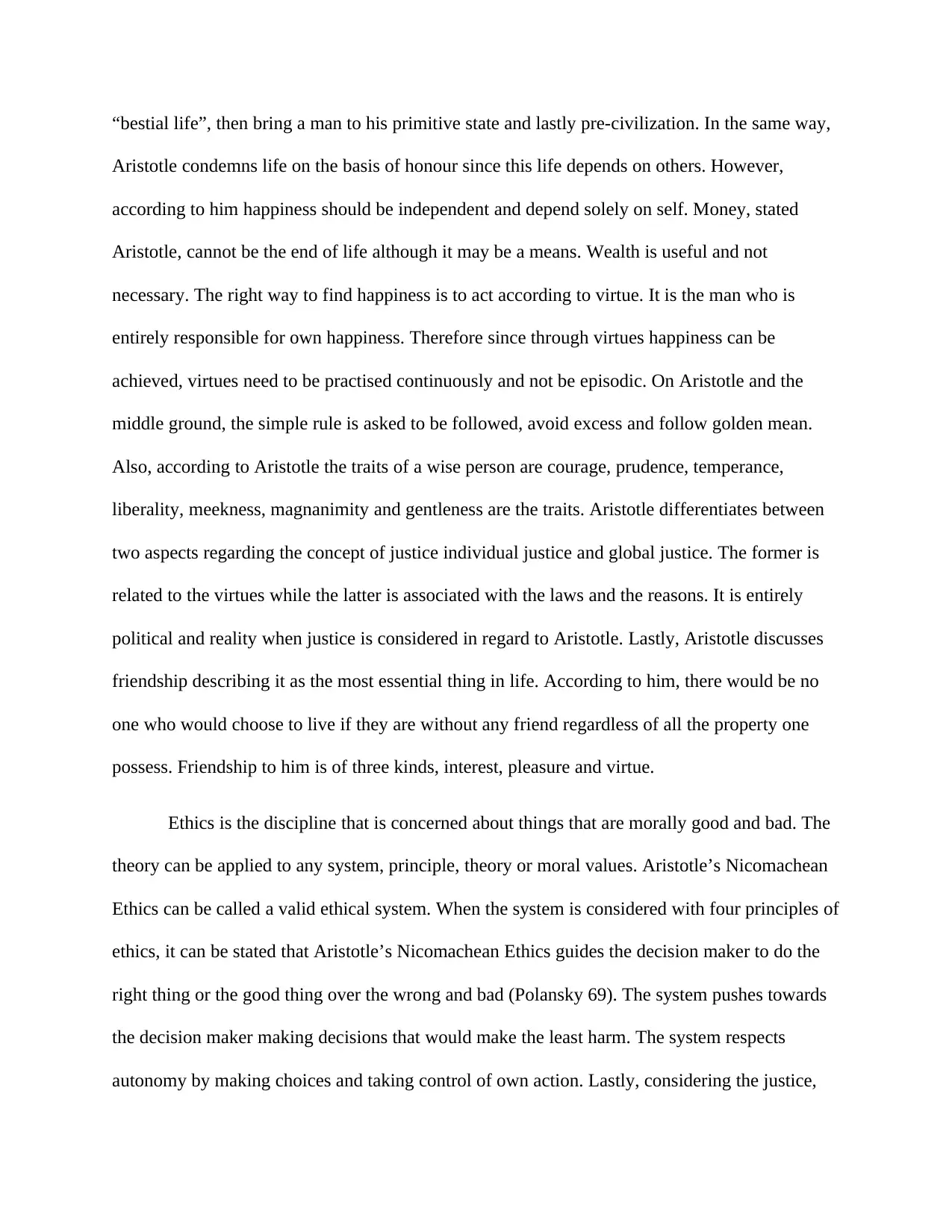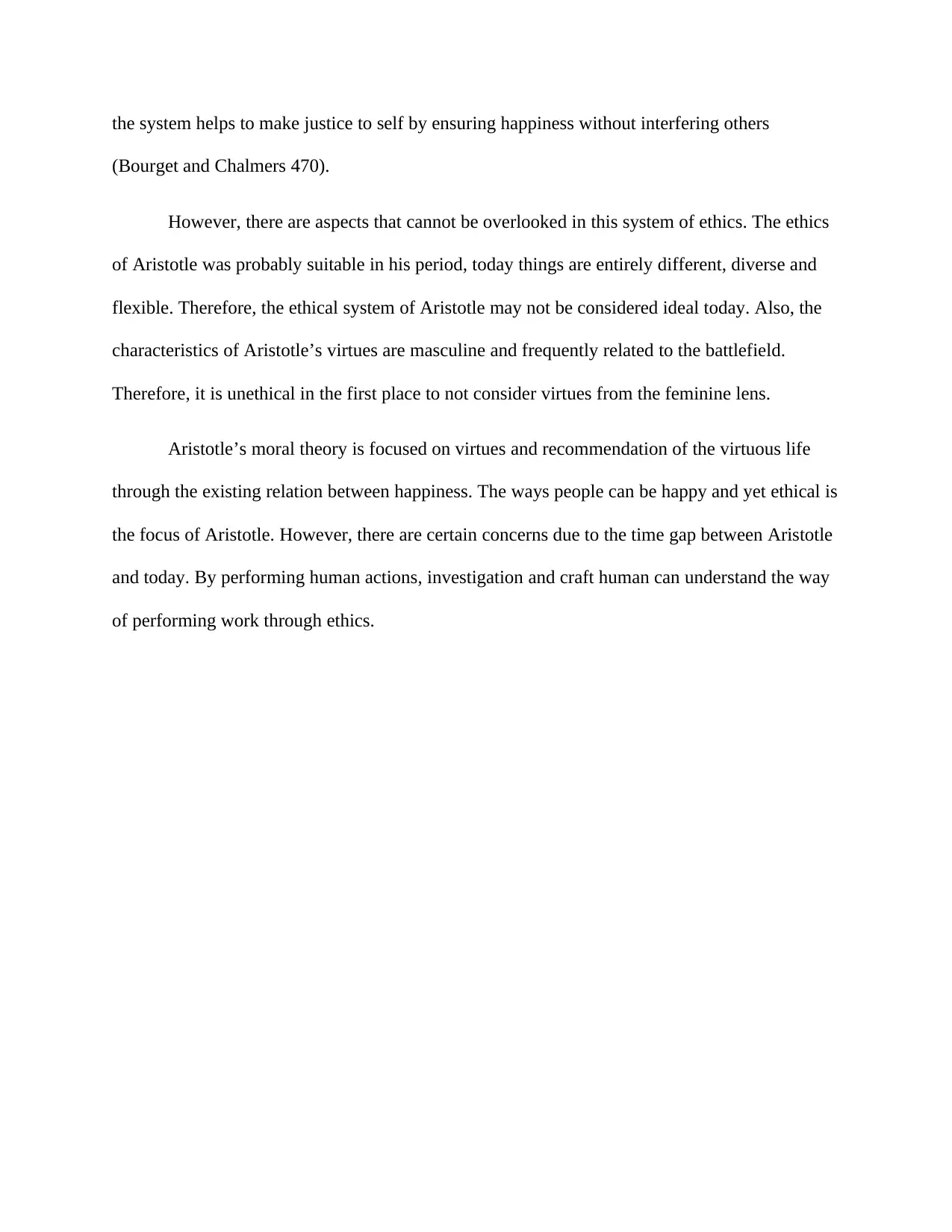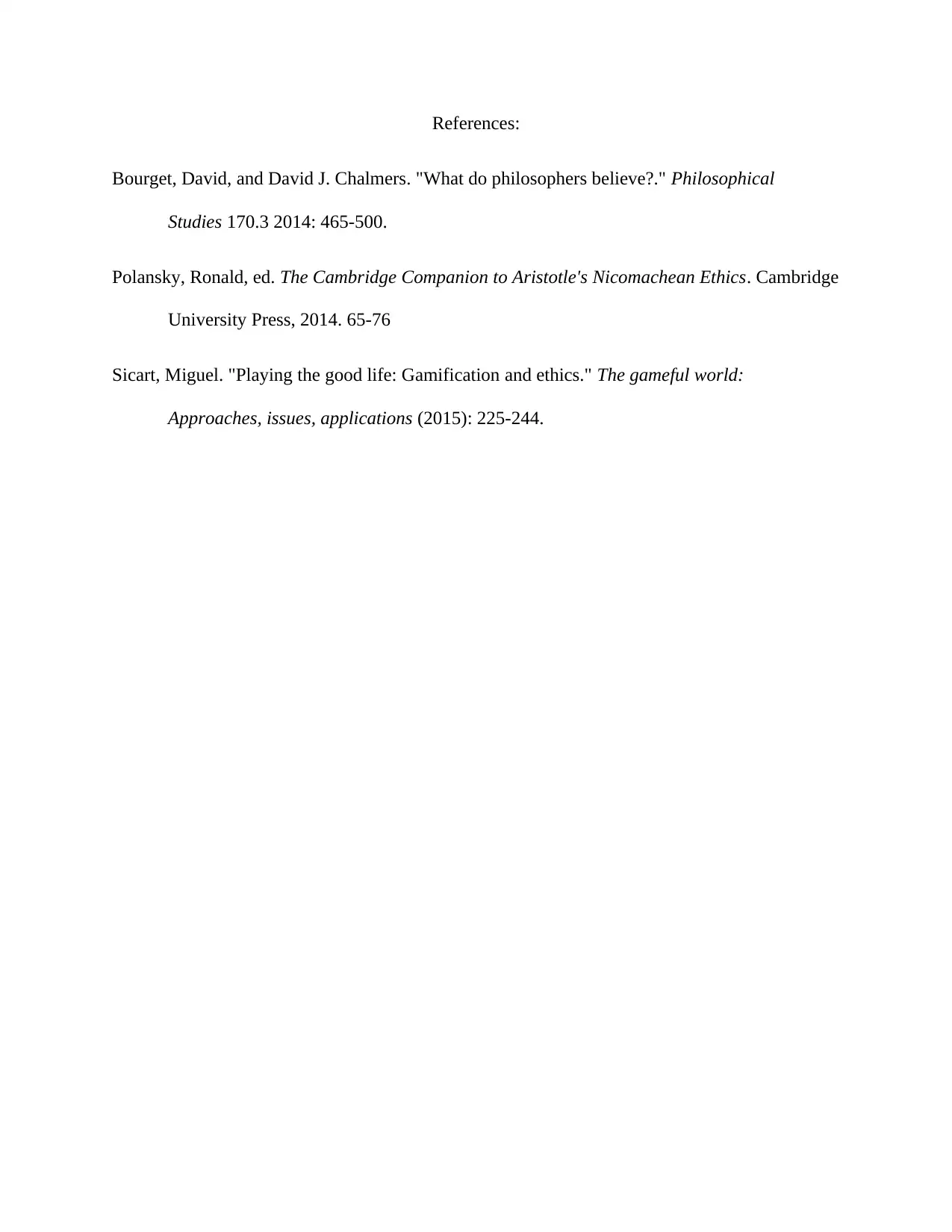Is Aristotle's Nicomachean Ethics a Valid Ethical System Today?
VerifiedAdded on 2023/04/24
|4
|959
|69
Essay
AI Summary
This essay delves into Aristotle's Nicomachean Ethics, examining its core tenets and evaluating its validity as an ethical system. It discusses Aristotle's views on happiness, virtue, and the 'middle ground,' as well as his concepts of justice and friendship. The essay argues that while the Nicomachean Ethics offers valuable guidance on moral decision-making, aligning with principles of beneficence, non-maleficence, autonomy, and justice, its historical context and masculine-centric virtues present limitations in contemporary application. The analysis considers the relevance of Aristotle's ethical framework in today's diverse and flexible world, highlighting both its enduring insights and potential shortcomings.

1Student’s name
Name of the student:
Name of the professor:
Subject:
Date:
THE NICOMACHEAN ETHICS
Aristotle has given the world immense knowledge including a wide range of aspects such
as arts, science and politics. By the modern audiences, he is well remembered through his answer
of human’s most basic question, what it means to be happy. The paper aims to discuss Aristotle’s
the Nicomachean Ethics and argue if it is an ethical system or not with reasons.
One of the most influential books of the moral philosophy is The Nicomachean Ethics by
Aristotle. All philosophers including Rawls and Kant have discussed their perspective on the
good life and happiness. In this book, Aristotle raises questions regarding virtues. The ways one
should act or the way one should live. According to him, a man should act according to reasons.
The moral that Aristotle wanted to convey was the intention of action will be overridden once the
actions are based on ethics. There six aspects on which Aristotle has presented his thoughts. The
six books are based on, politics and morality, happiness, wealth, the middle ground, justice and
friendship.
According to Aristotle, good is the supreme goal of life. The highest human good is
happiness. He distinguished three types of happiness, pleasure, politics and meditation. Pleasure
is the life as the body, politics is the life as per the rhetoric of honour and meditation is according
to the reason (Sicart 230). Creating hierarchy, Aristotle states the pursuit of pleasure is a form of
Name of the student:
Name of the professor:
Subject:
Date:
THE NICOMACHEAN ETHICS
Aristotle has given the world immense knowledge including a wide range of aspects such
as arts, science and politics. By the modern audiences, he is well remembered through his answer
of human’s most basic question, what it means to be happy. The paper aims to discuss Aristotle’s
the Nicomachean Ethics and argue if it is an ethical system or not with reasons.
One of the most influential books of the moral philosophy is The Nicomachean Ethics by
Aristotle. All philosophers including Rawls and Kant have discussed their perspective on the
good life and happiness. In this book, Aristotle raises questions regarding virtues. The ways one
should act or the way one should live. According to him, a man should act according to reasons.
The moral that Aristotle wanted to convey was the intention of action will be overridden once the
actions are based on ethics. There six aspects on which Aristotle has presented his thoughts. The
six books are based on, politics and morality, happiness, wealth, the middle ground, justice and
friendship.
According to Aristotle, good is the supreme goal of life. The highest human good is
happiness. He distinguished three types of happiness, pleasure, politics and meditation. Pleasure
is the life as the body, politics is the life as per the rhetoric of honour and meditation is according
to the reason (Sicart 230). Creating hierarchy, Aristotle states the pursuit of pleasure is a form of
Paraphrase This Document
Need a fresh take? Get an instant paraphrase of this document with our AI Paraphraser

“bestial life”, then bring a man to his primitive state and lastly pre-civilization. In the same way,
Aristotle condemns life on the basis of honour since this life depends on others. However,
according to him happiness should be independent and depend solely on self. Money, stated
Aristotle, cannot be the end of life although it may be a means. Wealth is useful and not
necessary. The right way to find happiness is to act according to virtue. It is the man who is
entirely responsible for own happiness. Therefore since through virtues happiness can be
achieved, virtues need to be practised continuously and not be episodic. On Aristotle and the
middle ground, the simple rule is asked to be followed, avoid excess and follow golden mean.
Also, according to Aristotle the traits of a wise person are courage, prudence, temperance,
liberality, meekness, magnanimity and gentleness are the traits. Aristotle differentiates between
two aspects regarding the concept of justice individual justice and global justice. The former is
related to the virtues while the latter is associated with the laws and the reasons. It is entirely
political and reality when justice is considered in regard to Aristotle. Lastly, Aristotle discusses
friendship describing it as the most essential thing in life. According to him, there would be no
one who would choose to live if they are without any friend regardless of all the property one
possess. Friendship to him is of three kinds, interest, pleasure and virtue.
Ethics is the discipline that is concerned about things that are morally good and bad. The
theory can be applied to any system, principle, theory or moral values. Aristotle’s Nicomachean
Ethics can be called a valid ethical system. When the system is considered with four principles of
ethics, it can be stated that Aristotle’s Nicomachean Ethics guides the decision maker to do the
right thing or the good thing over the wrong and bad (Polansky 69). The system pushes towards
the decision maker making decisions that would make the least harm. The system respects
autonomy by making choices and taking control of own action. Lastly, considering the justice,
Aristotle condemns life on the basis of honour since this life depends on others. However,
according to him happiness should be independent and depend solely on self. Money, stated
Aristotle, cannot be the end of life although it may be a means. Wealth is useful and not
necessary. The right way to find happiness is to act according to virtue. It is the man who is
entirely responsible for own happiness. Therefore since through virtues happiness can be
achieved, virtues need to be practised continuously and not be episodic. On Aristotle and the
middle ground, the simple rule is asked to be followed, avoid excess and follow golden mean.
Also, according to Aristotle the traits of a wise person are courage, prudence, temperance,
liberality, meekness, magnanimity and gentleness are the traits. Aristotle differentiates between
two aspects regarding the concept of justice individual justice and global justice. The former is
related to the virtues while the latter is associated with the laws and the reasons. It is entirely
political and reality when justice is considered in regard to Aristotle. Lastly, Aristotle discusses
friendship describing it as the most essential thing in life. According to him, there would be no
one who would choose to live if they are without any friend regardless of all the property one
possess. Friendship to him is of three kinds, interest, pleasure and virtue.
Ethics is the discipline that is concerned about things that are morally good and bad. The
theory can be applied to any system, principle, theory or moral values. Aristotle’s Nicomachean
Ethics can be called a valid ethical system. When the system is considered with four principles of
ethics, it can be stated that Aristotle’s Nicomachean Ethics guides the decision maker to do the
right thing or the good thing over the wrong and bad (Polansky 69). The system pushes towards
the decision maker making decisions that would make the least harm. The system respects
autonomy by making choices and taking control of own action. Lastly, considering the justice,

the system helps to make justice to self by ensuring happiness without interfering others
(Bourget and Chalmers 470).
However, there are aspects that cannot be overlooked in this system of ethics. The ethics
of Aristotle was probably suitable in his period, today things are entirely different, diverse and
flexible. Therefore, the ethical system of Aristotle may not be considered ideal today. Also, the
characteristics of Aristotle’s virtues are masculine and frequently related to the battlefield.
Therefore, it is unethical in the first place to not consider virtues from the feminine lens.
Aristotle’s moral theory is focused on virtues and recommendation of the virtuous life
through the existing relation between happiness. The ways people can be happy and yet ethical is
the focus of Aristotle. However, there are certain concerns due to the time gap between Aristotle
and today. By performing human actions, investigation and craft human can understand the way
of performing work through ethics.
(Bourget and Chalmers 470).
However, there are aspects that cannot be overlooked in this system of ethics. The ethics
of Aristotle was probably suitable in his period, today things are entirely different, diverse and
flexible. Therefore, the ethical system of Aristotle may not be considered ideal today. Also, the
characteristics of Aristotle’s virtues are masculine and frequently related to the battlefield.
Therefore, it is unethical in the first place to not consider virtues from the feminine lens.
Aristotle’s moral theory is focused on virtues and recommendation of the virtuous life
through the existing relation between happiness. The ways people can be happy and yet ethical is
the focus of Aristotle. However, there are certain concerns due to the time gap between Aristotle
and today. By performing human actions, investigation and craft human can understand the way
of performing work through ethics.
⊘ This is a preview!⊘
Do you want full access?
Subscribe today to unlock all pages.

Trusted by 1+ million students worldwide

References:
Bourget, David, and David J. Chalmers. "What do philosophers believe?." Philosophical
Studies 170.3 2014: 465-500.
Polansky, Ronald, ed. The Cambridge Companion to Aristotle's Nicomachean Ethics. Cambridge
University Press, 2014. 65-76
Sicart, Miguel. "Playing the good life: Gamification and ethics." The gameful world:
Approaches, issues, applications (2015): 225-244.
Bourget, David, and David J. Chalmers. "What do philosophers believe?." Philosophical
Studies 170.3 2014: 465-500.
Polansky, Ronald, ed. The Cambridge Companion to Aristotle's Nicomachean Ethics. Cambridge
University Press, 2014. 65-76
Sicart, Miguel. "Playing the good life: Gamification and ethics." The gameful world:
Approaches, issues, applications (2015): 225-244.
1 out of 4
Related Documents
Your All-in-One AI-Powered Toolkit for Academic Success.
+13062052269
info@desklib.com
Available 24*7 on WhatsApp / Email
![[object Object]](/_next/static/media/star-bottom.7253800d.svg)
Unlock your academic potential
Copyright © 2020–2026 A2Z Services. All Rights Reserved. Developed and managed by ZUCOL.





